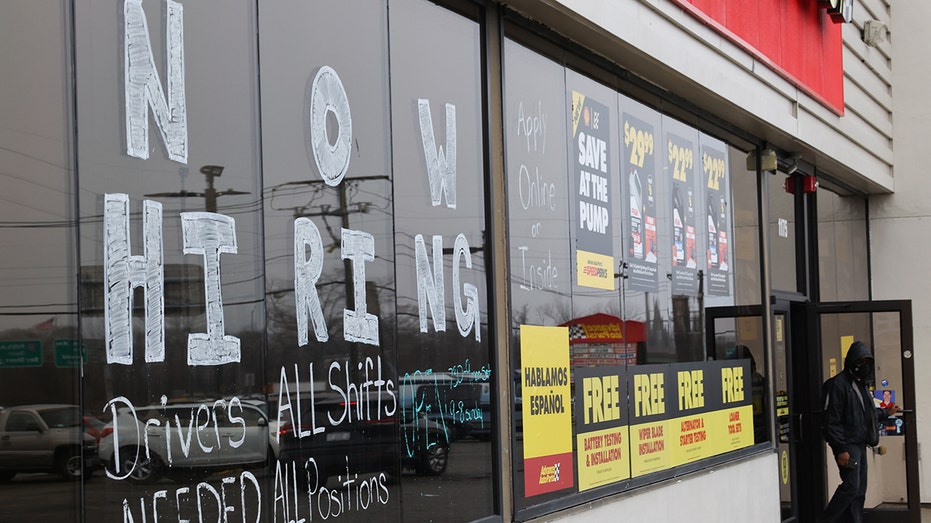US economy likely added jobs at healthy clip in April despite worsening labor shortage
Economists expect employers to have hired 391,000 workers in April
Market expert on March jobs report: It's a good time to be a worker
Slatestone Wealth chief management strategist Kenny Polcari discusses inflation and the March jobs report, arguing if inflation continues to 'get strong its going to put pressure on the market.'
U.S. job growth likely continued at a brisk clip in April, suggesting the labor market is still strong despite headwinds from the highest inflation in four decades, global supply chain constraints and a worsening labor shortage.
The Labor Department on Friday morning is releasing its closely watched April jobs report, which is projected to show that payrolls increased by 391,000 last month and the unemployment rate dropped to 3.5%, according to a median estimate by Refinitiv economists.
HOW THE FEDERAL RESERVE MISSED THE MARK ON SURGING INFLATION
"Jobs creation, or hiring, should be on par with the previous solid reading and the unemployment rate could slip to match the pre-pandemic low of 3.5%," said Mark Hamrick, senior economic analyst at Bankrate. "Wage growth should be solid, but insufficient to stay ahead of rising consumer prices."
Businesses are eager to onboard new employees and are raising wages in order to attract workers as they confront a labor shortage. There are roughly 11.3 million open jobs – the third-highest on record – while the pace of layoffs has moderated in recent months.
The Labor Department said in a separate report on Tuesday that 4.5 million Americans, or about 3% of the workforce, quit their jobs in March. That's up from 4.4 million in February and just slightly tops the previous record notched in November. By comparison, pre-pandemic levels typically hovered around 3.6 million.
Meanwhile, the number of job openings rose to 11.5 million by the end of March – meaning there are close to 2 open jobs for every unemployed person.

A large "Now Hiring" advertisement posted on the windows of the Advance Auto Parts store in Bay Shore, New York on March 24, 2022. ((Photo by Steve Pfost/Newsday RM via Getty Images) / Getty Images)
As a result, millions of workers are seeing the largest pay gains in years, as companies compete with one another for a limited number of employees. Many of those gains have been eroded, however, by the hottest inflation in nearly four decades that has pushed the price of everyday necessities like gasoline, clothing and food significantly higher.
The rising prices have been bad news for President Biden, who has seen his approval rating plunge as inflation climbs higher.
Inflation has also forced the Federal Reserve to move more aggressively: Central bank policymakers raised interest rates by 25 basis points in March and 50 basis points in May, and have signaled that similarly-sized hikes are on the table at coming meetings.
The data comes one day after U.S. stocks posted the worst session since 2020 on concerns about the impact of rising rates on the economy.
| Ticker | Security | Last | Change | Change % |
|---|---|---|---|---|
| I:DJI | DOW JONES AVERAGES | 50135.87 | +20.20 | +0.04% |
| SP500 | S&P 500 | 6964.82 | +32.52 | +0.47% |
| I:COMP | NASDAQ COMPOSITE INDEX | 23238.66991 | +207.46 | +0.90% |
GET FOX BUSINESS ON THE GO BY CLICKING HERE
Fed Chairman Jerome Powell has acknowledged there could be some "pain associated" with reducing inflation and curbing demand but pushed back against the notion of an impending recession, identifying the labor market and strong consumer spending as bright spots in the economy.
"It’s a strong economy," he said Wednesday. "Nothing about it suggests it’s close to or vulnerable to a recession."





















